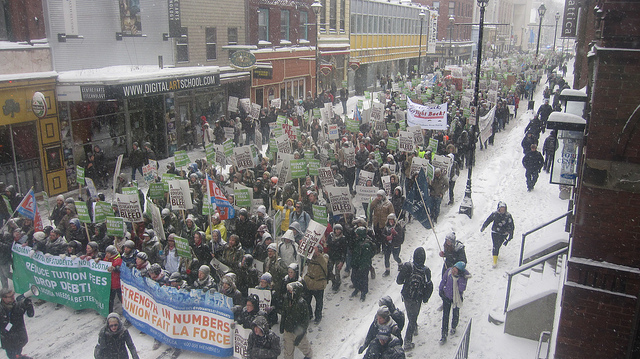Union Protests Hit Brazil But Fail To Connect To Youths
Union Protests Hit Brazil But Fail To Connect To Youths

Union Protests Hit Brazil But Fail To Connect To Youths
On June 11, protests were held in more than one hundred and fifty cities across Brazil. The day of mobilization was called by trade unions and traditional social movements like the Movimento Sem Terra. Protesters demanded a 40-hour work week, better working conditions, more investments in health and education and land reform. The nationwide action took place almost one month after the largest mobilization in a generation and as the left-leaning government tries to contain protests with reforms.
In Curitiba, around four hundred demonstrators answered the call of the main trade union centrals and gathered in the city's downtown. Standing on a truck, various trade union leaders called for a 40-hour work week as well as the end of outsourcing. Many trade union sympathizers were carrying flags and sung the national anthem at Praça Rui Barbosa while public transports were partially paralyzed during three hours in the state capital of Parana.
"We were here to demand a 40-hour work-week. We also want outsourcing to stop," explained Jair Da Silva, a trade union leader from metallurgy union SMC. According to Da Silva, salaries which range from 1,000 reais onwards are also a major source of discontent. "We here to show our support to the working class, we wearing our work uniforms to show that we are not here to break or vandalize," added the trade union leader.
Early in the afternoon, a group of mailmen from Correios (the Brazilian Post and Telegraph Corporation) joined the gathering carrying a sign reading « We are the worst paid public workers in this country.» According to Alexandre Basilio, an ex-Correios employee who took part in the protests in June, mailmen make around 1,200 reais a month and walk around 14 kilometers a day. Basilio said he feared that the Brazilian public mail company would be privatized in the near future. "Bosses do not negotiate. This is the just the beginning of new actions. There will be strikes," he said.
Though the agenda focused on labor rights, better public education and health were amongst the key requests of the demonstrators. "We want better working conditions and less students," said primary school teacher and APP union leader Miguel Baez. "I'm only half-satisfied with the political response," said the teacher. For João Negrão , President of the Teachers Association, the decision to use the totallity of oil revenues for education is far from enough. "We want more. Oil royalties only make up 1% of the PIB. We want 10% of the PIB to be invested into education," explained Negrão an English professor at the Federal University of Parana (UFPR).
Despite blocking several highways and major avenues around the country, the protest did not reach out to youths and non-trade union workers. The call issued by unions failed to bring students and workers from the private sector to the streets. "The movement started badly. The response of the unions was delayed," explained professor Luis Allan Kunzle who teaches mathematics at UFPR. « The left is trying to talk to the people but they don't know what to do,» explains the trade-union member professor, who finds the political reforms called by Brazilian President Dilma Rousseff "horrible." According to him, trade-unions' traditional strategies fail to connect with the rest of the Brazilian society.
A few feminist and anarchist groups also took part in the gathering. Around twenty young students carrying black and red flags launched a round of samba, not far from a statue made for the occasion showing a blind Rousseff. Last month, the left-wing head of state and first female President in the history of Brazil saw her popularity rate drop from 57 to 30%, according to a poll from DataFolha.
In June, grassroots movements against mass transportation hikes and mega-event spending took more than a million Brazilians to the streets. Shocking images of police brutality spread quickly via social networks, and led to a massive national wave of protest. This all happened during the FIFA Confederation Cup, a tune-up for next year’s World Cup. The mega-event became a lighting rod for the protesters. Almost every game was met with passionate protests. The tournament gave the movement an international dimension. The demonstrations were widely covered by foreign reporters.
The Movimento Passe Livre (Free Fare Movement) was credited for igniting the revolt but the movement quickly began to incorporate other demands. In contrast to the movements that support the governing Workers Party, the revolt was led by urban middle class youth and achieved to lower the the price of public transport in several Brazilian cities including Sao Paulo, Rio de Janeiro, Porto Alegre and Curitiba.

